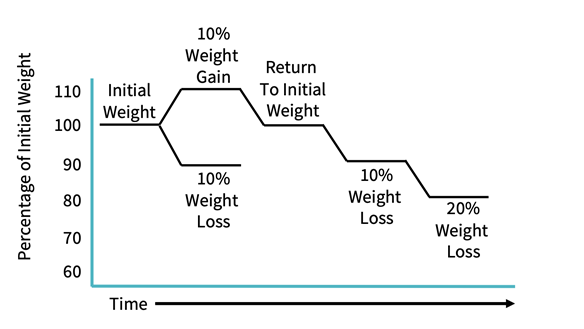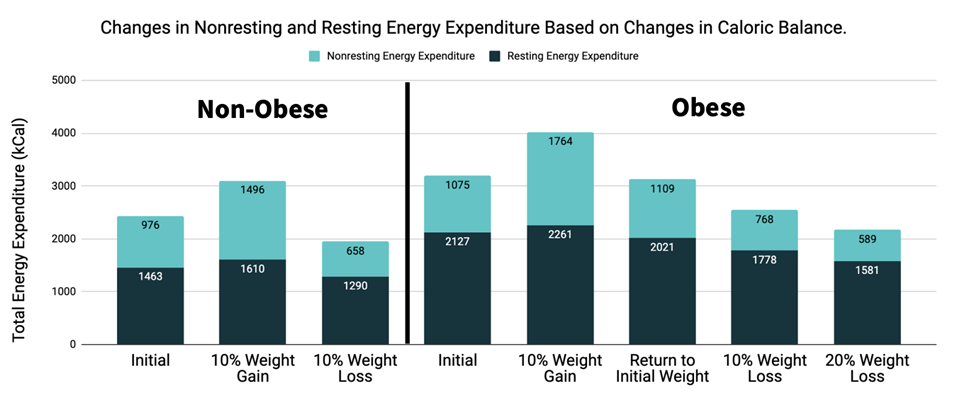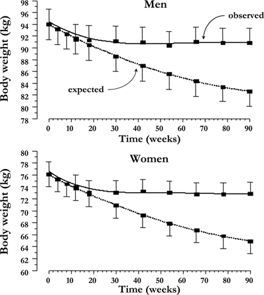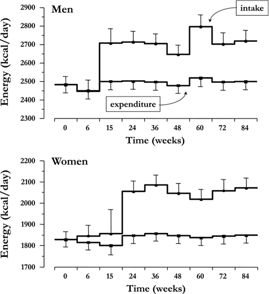There is a phenomenon most of us experience in life. We maintain very similar body weight and body shape for years on end and then suddenly it feels like our body’s changed overnight and then we have a new body that we were not expecting.Then we find it hard to change that body into something different.
This is something we often hear referred to as a bodyweight set point, which refers to the idea that our bodies have a natural body weight they “want” to be at and it will adapt and adjust to maintain that body weight, both for the good (keeping us from gaining weight) and the bad (preventing us from losing weight). Today we are going to do a deep dive into this idea and see if this is true, or if there is more to the story.
If you want a great tool for tracking weight loss, see the NASM calorie deficit calculator.
What is Set Point Theory?
Set Point Theory is an idea that the human body has a specific weight that it wants to maintain and that your body will adapt to hold that weight if possible. Essentially, this idea means that your body will adjust to periods of more food and less food to try and keep body weight stable.
Is Set Point Theory a Myth?
Is Set Point Theory a myth? Well… it is a myth in some sense and is not a myth in others. The truth about this topic is that it is complicated, but there are some very useful ways to think about it. Let’s start simple and then get a little more complex as we go.
Set Point Theory is true in the sense that our bodies do have adaptive mechanisms in place that aim to keep our body weight stable; however, it is a myth in that they work well enough in our modern environment to prevent weight gain or stop weight loss.
We can dive into the first part through a few examples from the scientific literature.
Examples of Adaptive Mechanisms
One experiment was conducted in the early 1990s that looked at how a person’s energy expenditure would change if they were to overeat (calorie surplus) or under eat (calorie deficit). This experiment took people and had them either lose weight right off the bat or gain weight and then eventually lose weight.
Importantly, they did this experiment in people who had normal BMIs and people with obesity.

What they found in this study was that when people were over-fed their bodies tried to defend against weight gain by increasing the amount of physical activity they engaged in (meaning they moved around more during the day without structured exercise). Their basal metabolism also increased a small amount, but not much.
The opposite was also true. When people were under-fed, they moved a lot less and their basal metabolism decreased slightly.

However, these adaptations showed that in response to calorie surpluses or deficits the body alters its expenditure, mostly around the amount of physical activity expended in a day. Also, even though these adaptations occurred, they were not able to fully prevent a concerted effort to gain or lose weight. They slowed the progress slightly in each direction, but it did not prevent it.
Another study conducted that examined this question, but from the perspective of food intake. Essentially asking the question of, if your body is out of weight balance, will your food intake behaviors change to prevent you from losing weight?
This study was very interesting in that they took a group of people that were on a medication that essentially causes the body to lose around 200 calories per day without the individual actually knowing they are losing those calories.
What they found was that initially people lost weight as there was a large daily mismatch between intake and expenditure. However, over the span of a few months these people lost less overall weight than expected, which was primarily due to the individuals increasing their calorie intake to offset the weight loss.


Now, this study also has a few important caveats. The first is that people still saw changes in body weight, and it took time for their behaviors to stop the weight loss. Second, this daily calorie deficit is relatively small, and people were not consciously trying to control or manage weight.
Examples of Set Point Theory Not Being Enough
While we just discussed examples of mechanisms supporting Set Point Theory, we have a lot of examples showing that these mechanisms just aren’t enough to prevent changes in body weight.
Some of the most obvious examples are the shifts in average body weight across the world over the last century. Obesity rates have climbed steadily since the middle of the 20th century, showing that at a population level, body weights can and do change.
Another example is the fact that targeting weight-loss interventions such as lifestyle (i.e., diet and exercise), bariatric surgery, and medication can all induce substantial and meaningful weight change.
Why Do People Have Differing Set Point Weights?
People can experience large stretches of their lives where their body weight does not change much, which often feels like a “set point”. Also, people have substantially different set points, both in terms of absolute body weight as well as body adiposity (think body fat percentage).
There are myriad reasons why people have different set points and why we don’t all weigh the same all the time. Here is a shortlist of reasons why:
● Height - taller people have more mass than shorter people.
● Genetically determined lean mass - some people genetically have more lean body mass.
● Biological sex - bone density and absolute muscle mass and relative body adiposity differences between the biological sexes.
● Habits - lifestyle choices drastically affect body mass.
Can You Change Your Set Point Weight with Dieting and Exercise?
Set point weight is best thought of as a “floating” point that will change over time. This floating point can be changed with dieting and exercise, but it is best to think of these in two separate categories.
Dieting, or nutrition, has perhaps the greatest effect on total body mass, as it is the most effective way to create a sustainable, long-term calorie deficit that allows the body to lose weight (mass). Thousands of randomized trials have shown that dietary interventions are effective enough to overcome the body weight set point. Furthermore, if habits are sustained, the new set point can be maintained.
Exercise is an excellent tool for changing the tissue quality of the body, such as adding more lean mass and improving the cardiovascular system. Physical activity, which includes structured exercise AND non-exercise activity, such as occupation-based activity and daily chores, are also substantial drivers of changing body weight.
Is Set Point Weight Similar to Body Type?
Set point weight is not directly linked to body type and they are generally different concepts. Body type refers more to the genetic proportions of your body and the genetically predetermined aspects of it, such as what is your genetic baseline for lean mass.
However, like Set Point, diet and exercise can drastically affect the body type that you have over the course of your lifetime.
















